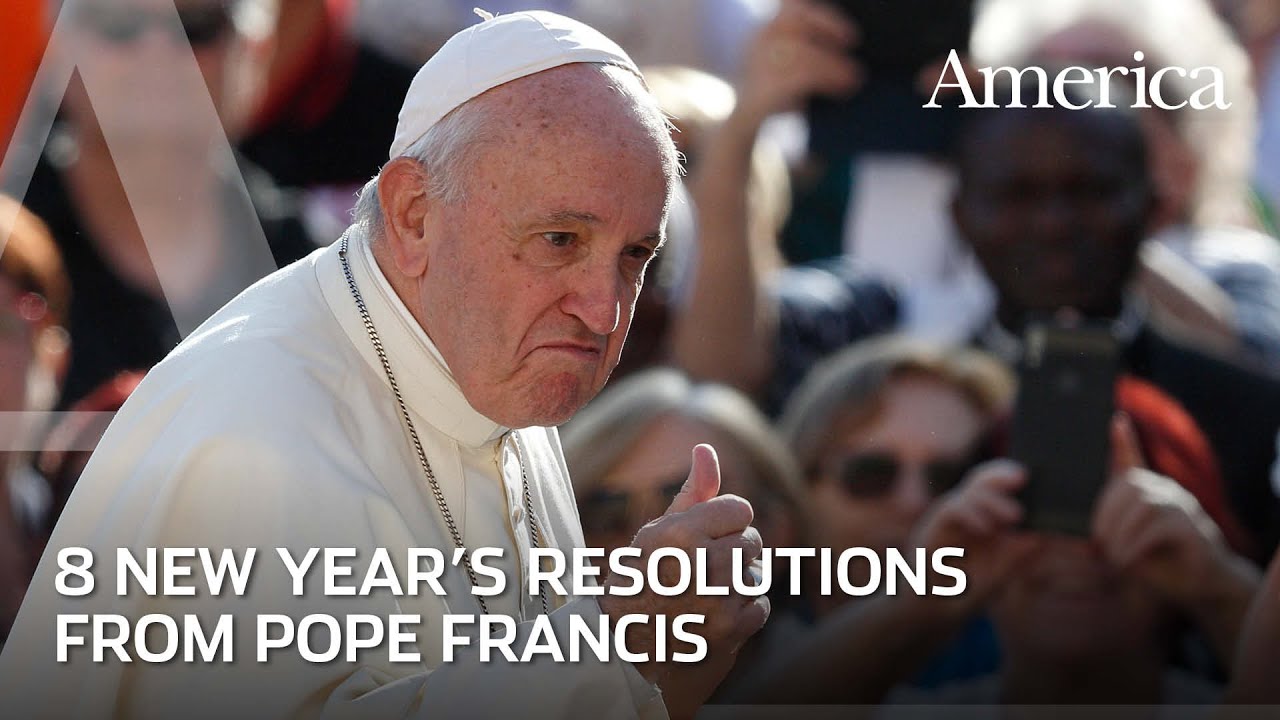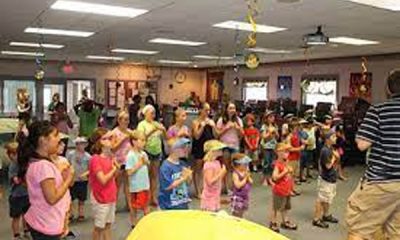News
8 New Year’s Resolutions Inspired by Pope Francis

If you cannot believe it is about to be 2022 you are not alone. But ready or not, the new year is here and with it our annual opportunity to take stock and set goals, with a little help from Pope Francis.
Since the first months of the Covid-19 pandemic, Francis has had two refrains: We are all “in the same boat,” and “our post-pandemic world will necessarily be different from what it was before the pandemic.” With that in mind, we mined the pope’s homilies and speeches from the past year for advice for building stronger relationships—with God, with our neighbors and with the earth.
1. Volunteer for a local charity or non-profit.
In 2022, maybe you would like to give back in a meaningful way by volunteering at an organization that does good work in your community. But where do you start? And how do you choose where to give your time?
Pope Francis has some ideas, taking a page from someone who knows a thing or two about selflessness: St. Joseph. In the first of a series of catecheses on St. Joseph, Pope Francis said, “Today, Joseph teaches us this: ‘Do not look so much at the things that the world praises, look into the corners, look in the shadows, look at the peripheries, at what the world does not want.’ He reminds each of us to consider important what others discard.”
Let us ask ourselves: Who is forgotten or ignored? What resources do I have to share that might help someone else? How can I reorient my thinking so I am more concerned with what matters to God than what matters to earthly society? With these questions guiding our discernment, maybe we can make time in our busy and chaotic lives this year not simply to volunteer but to become what Pope Francis calls St. Joseph: masters of the essential.
2. Stop judging others.
Judging and gossiping about those around us is, as Pope Francis said in his audience on Nov. 3, so easy to do that we often fall into it without thinking.
The pope offered a challenging alternative, to instead “take a look at yourself.” With this shift in perspective, Pope Francis suggests we might discover something important: “It is good to ask ourselves what drives us to correct a brother or a sister, and if we are not in some way co-responsible for their mistake.” Instead of nitpicking our neighbors, we can be honest with ourselves about our own shortcomings, making space for compassion instead of criticism
3. Take Scripture to heart.
Becoming more familiar with the Bible in the new year is a great goal, but be careful: Without the right approach, you might find yourself annoying Pope Francis. In his audience on Jan. 27, the pope admitted, “It irritates me a little when I hear Christians who recite verses from the Bible like parrots.”
Of course, the pope was not discouraging Catholics from reading and knowing the Bible. Quite the opposite! Pope Francis was expressing frustration with an approach to Scripture that focuses simply on rote memorization rather than on personal encounter. His words reminded us that sacred Scripture is alive, that it speaks to us on an individual basis. Even though biblical stories are thousands of years old, we can recognize ourselves intimately in the characters and scenarios.
So please, read and study the Bible this year. But know what Pope Francis says you’re signing up for: “The Word of God, infused with the Holy Spirit, when it is received with an open heart, does not leave things as they were before: never.”
4. Take one concrete step to become more environmentally conscious.
This year, world leaders gathered in Glasgow to discuss climate change at COP26. While Pope Francis was unable to be there in person, he did share a message. And let’s just say this: He did not hold back.
If you want to do your part to protect the planet, here is the big takeaway from the pope’s words: You should start now. Francis wrote to the conference with a tone of great urgency, recommending courses of action for both leaders and civilians. If there are lifestyle changes you have wanted to make in an effort to be more environmentally conscious, now is the time to get around to them. If there are things you think political leaders could be doing to protect all of us from the climate crisis, make them known—through your voice and your vote. As the pope said, “there is no time to waste.”
Francis’ message also offered spiritual advice for a world struggling with the effects of climate change. “We need both hope and courage,” he wrote. “Humanity possesses the wherewithal to effect this change, which calls for a genuine conversion, individual as well as communitarian, and a decisive will to set out on this path.”
5. Pray every day. Even when it is hard.
“Pray without ceasing,” the Apostle Paul exhorts us in his letter to the Thessalonians. A worthy goal, to be sure. But maybe this year, you simply want to be able to pray a nightly Examen without falling asleep or pray a rosary without starting to go through your to-do list after one decade.
Pope Francis understands your struggle. “Praying is not something easy, and this is why we flee from it,” he said on May 12. “Every time we want to pray, we are immediately reminded of many other activities, which at that moment seem more important and more urgent. This happens to me too!”
Pope Francis acknowledged the forces that can stand in the way of prayer: distraction, spiritual barrenness, sloth. All these, the pope said, must be met with perseverance:
True progress in spiritual life does not consist in multiplying ecstasies, but in being able to persevere in difficult times: walk, walk, walk on…. and if you are tired, stop a bit and then start walking again.
If you are feeling discouraged about your progress in prayer, know that Pope Francis is struggling and walking right there with you—and do not give up!
6. Let go of a grudge or two.
Too often, it is the people we love (and see) the most who bear the brunt of our anger, frustration or pure exhaustion. So if you have found yourself sniping at your spouse or being short with your close friends, Pope Francis has some advice: Don’t end the day angry.
“Listen to me well,” Pope Francis said in his Dec. 1 general audience. “Never finish the day end without making peace. ‘We fought. My God, I said bad words. I said awful things. But now, to finish the day, I must make peace.’ You know why? Because the cold war the next day is very dangerous.”
So whether it’s a caress on your husband or wife’s cheek, as the pope suggested, or a conciliatory text to a friend, do not let today’s grudges fester till the morning.
7. Get off Twitter.
After the pandemic moved much of our lives online—YouTube Masses, Zoom happy hours, untold hours of Covid-19 doomscrolling on Twitter—you might be ready for a social media cleanse in 2022.
Pope Francis has repeatedly urged people to get off their smartphones and to start communicating with the person in front of them. This year, in a message to journalists, he again warned of “the tyranny of always being online”:
Even if you are not a journalist, you can take a page from our very offline pope and make 2022 a year filled with IRL conversation and friendship.
8. Call your loved ones regularly.
“When was the last time we visited or telephoned an elderly person in order to show our closeness and to benefit from what they have to tell us?” That was Pope Francis’ question in his homily for the World Day for Grandparents and the Elderly on July 26.
Few groups have been more profoundly affected by the ongoing pandemic than our elders. Now that vaccines and boosters have made it possible to safely visit them, what if you took the next year to listen to or even record their stories and wisdom?
“Let us not lose the memory preserved by the elderly, for we are children of that history, and without roots, we will wither,” the pope said. “They protected us as we grew, and now it is up to us to protect their lives, to alleviate their difficulties, to attend to their needs and to ensure that they are helped in daily life and not feel alone.”
http://theendtimeradio.com
world news
ശാരോൻ ഫെലോഷിപ്പ് ചർച്ച് യുഎഇ റീജിയൻ സൺഡേസ്കൂൾ സി ഇ എം സംയുക്ത വാർഷികവും സൺഡേ സ്കൂൾ ഗ്രാജുവേഷനും നടന്നു

ഷാർജ: ശാരോൻ ഫെലോഷിപ് ചർച്ച് പുത്രിക സംഘടനകളായ സണ്ടേസ്കൂൾ അസോസിയേഷൻ്റെയും ക്രിസ്ത്യൻ ഇവാഞ്ചലിക്കൽ മൂവ്മെൻ്റിൻ്റെയും (സി ഇ എം) യു എ ഇ റീജിയൻ സംയുക്ത വാർഷികം നടത്തി. 08-02-2025 ശനിയാഴ്ച വൈകിട്ട് 6 മണി മുതൽ 10 മണി വരെ ഷാർജ യൂണിയൻ ചർച്ചിൽ വെച്ച് റീജിയൻ സണ്ടേസ്കൂൾ അസോസിയേഷൻ ഡയറക്ടർ പാസ്റ്റർ ബ്ലസൻ ജോർജിൻ്റെ അധ്യക്ഷതയിൽ കൂടിയ യോഗം റീജിയൻ സി ഇ എം പ്രസിഡൻ്റ് പാസ്റ്റർ സന്തോഷ് സെബാസ്റ്റ്യൻ പ്രാർത്ഥിച്ച് ആരംഭിക്കുകയും ശാരോൻ സഭാ റീജിയൻ പാസ്റ്റർ ജോൺസൻ ബേബി ഉദ്ഘാടനം നിർവഹിക്കുകയും ചെയ്തു. റീജിയൻ സി ഇ എം ജോയിൻ്റ് ട്രഷറർ ബ്രദർ ഷാജി എബ്രഹാം സ്വാഗത പ്രസംഗം നടത്തി. അധ്യക്ഷ പ്രസംഗത്തിന് ശേഷം വിവിധ സഭകളുടെ ഗാനം,സ്പെഷ്യൽ പ്രോഗ്രാം,ഗ്രൂപ്പ് സോംഗ്, ഗ്രൂപ്പ് ആക്ഷൻ സോംഗ്, കോറിയോഗ്രഫി, സ്കിറ്റ്,ഷാഡോ മൈം തുടങ്ങിയ വ്യത്യസ്തമായ പ്രോഗ്രാമുകൾ നടന്നു.പാസ്റ്റർ സാം കോശി (അസോ. റീജിയൻപാസ്റ്റർ),പാസ്റ്റർ ഗിൽബെർട്ട് ജോർജ് (റീജിയൻ സെക്രട്ടറി), പാസ്റ്റർ ഡോ.ഷിബു വർഗീസ്(അബുദബി സെൻ്റർ പാസ്റ്റർ), പാസ്റ്റർ ബിജി ഫിലിപ്,ബ്രദർ ജോമോൻ പാറക്കാട്ട്,ബ്രദർ റിനു ഡി എന്നിവർ ആശംസാ സന്ദേശങ്ങൾ അറിയിച്ചു.റീജിയൻ സി ഇ എം ടാലൻ്റ് ടെസ്റ്റ് വിജയികൾക്കുള്ള സമ്മാന ദാനവും സണ്ടേസ്ക്കൂൾ പരീക്ഷാ റാങ്ക് ജേതാക്കൾക്കുള്ള സമ്മാന ദാനവും സർട്ടിഫിക്കറ്റ് വിതരണവും പഠനം പൂർത്തീകരിച്ചവരുടെ ഗ്രാജുവേഷനും നടന്നു. പാസ്റ്റർ ഡോ.ഷിബു വർഗീസ് ഗ്രാജുവേഷൻ സന്ദേശം നൽകി. പാസ്റ്റർ ജോൺസൻ ബേബി,പാസ്റ്റർ സാം കോശി,പാസ്റ്റർ ഗിൽബെർട്ട് ജോർജ്, പാസ്റ്റർ തോമസ് വർഗീസ്,പാസ്റ്റർ ബിജി ഫിലിപ്,ബ്രദർ ബിജു തോമസ്, ബ്രദർ എബ്രഹാം വർഗീസ്,ബ്രദർ ഷിബു ജോർജ്, ബ്രദർ ബെൻസ് മാത്യു,ബ്രദർ സാം പി മത്തായി തുടങ്ങിയവർ സമ്മാനദാനം നിർവഹിച്ചു. സണ്ടേസ്കൂൾ എക്സാം ഇൻവിജിലേറ്റേഴ്സായി പ്രവർത്തിച്ച 21 പേർക്ക് പ്രത്യേക അനുമോദനം നൽകി.എസ് എഫ് സി ക്രൈസ്റ്റ് ചർച്ച് ജബൽ അലി റീജിയൻ സി ഇ എം ടാലൻ്റ് പരിശോധനയിൽ ഏറ്റവും കൂടുതൽ പോയിന്റ് നേടിയതിനുള്ള ചാമ്പ്യൻഷിപ് ട്രോഫി കരസ്ഥമാക്കി. റീജിയനിലെ 17 സഭകളിൽ നിന്നായി 350 അംഗങ്ങൾ പങ്കെടുത്തു. ബെഥേൽ ശാരോൻ ചർച്ച് ക്വയർ പ്രെയ്സ് ആൻ്റ് വർഷിപ് നയിച്ചു. റീജിയൻ സി ഇ എം ജോയിൻ്റ് സെക്രട്ടറി ബ്രദർ സോജിത് സജി,റീജിയൻ സണ്ടേസ്കൂൾ അസോസിയേഷൻ എക്സാം കൺട്രോളർ ബ്രദർ എബി മാത്യു,ജനറൽ കോർഡിനേറ്റർ ബ്രദർ റോക്കി സാം, റീജിയൻ മീഡിയ ടീം സെക്രട്ടറി ബ്രദർ റ്റൈറ്റസ് പൊടിക്കുഞ്ഞ് മുതലായവർ ക്രമീകരണങ്ങൾക്ക് നേതൃത്വം നൽകി. റീജിയൻ സണ്ടേസ്കൂൾ സെക്രട്ടറി ബ്രദർ ബ്ലസൻ ലൂക്കോസ് നന്ദി പറഞ്ഞു. പാസ്റ്റർ ജോൺസൻ ബേബി പ്രാർത്ഥിച്ച് ആശീർവ്വാദം പറഞ്ഞ് യോഗം സമാപിച്ചു.
Sources:gospelmirror
National
മുനിയറ ബൈബിൾ കൺവൻഷൻ അനുഗ്രഹത്തോട് സമാപിച്ചു

ഫെയ്ത്ത് ഗോസ്പൽ മിഷന്റെ ആഭിമുഖ്യത്തിൽ നടത്തപ്പെടുന്ന ഹൈറേഞ്ചിന്റെ സുവിശേഷ സംഘമമായ 24-ാത് മുനിയറ ബൈബിൾ കൺവൻഷന് അനുഗ്രഹ സമാപ്തി. 2025 ഫെബ്രുവരി 18 ന് വൈകിട്ട് 5.30 മുതൽ 9.30 വരെ മുനിയറ അങ്കണവാടിയ്ക്ക് സമീപം വച്ച് നടന്ന മുനിയറ കൺവൻഷൻ പാസ്റ്റർ ഷാജി ഇടുക്കി ഉത്ഘാടനം നിർവഹിച്ചു. ഫെയ്ത്ത് ഗോസ്പൽ മിഷൻ പ്രസിഡൻ്റ് പാസ്റ്റർ ജയ്മോൻ അദ്ധ്യക്ഷത വഹിച്ചു. സമീപ പ്രദേശങ്ങളിലുമുള്ള സഭകളുടെയും ദൈവദാസൻമാരുടെയും ആത്മീയ പ്രവർത്തനമാണ് ഫെയ്ത്ത് ഗോസ്പൽ മിഷൻ. പാസ്റ്റർമാരായ പ്രിൻസ് തോമസ് റാന്നി, സജു ചാത്തന്നൂർ , അനീഷ് കാവാലം എന്നീവർ പ്രസംഗിച്ചു. ഫെയ്ത്ത് ഗോസ്പൽ സിoഗേഴ്സ് മുനിയറ ഗാനശുശൂഷയ്ക്ക് നേതൃത്വം നൽകി. പാസ്റ്റർ ബെന്നി മത്തായി (സെക്രട്ടറി ) പാസ്റ്റർ റ്റിജി സി.സി (ഖജാൻജി) ബ്രദർ ജോർജ് ഇ.സി (വൈസ് – പ്രസിഡന്റ്) ബ്രദർ അനീഷ് എൻ.എ (ജോ.സെക്രട്ടറി) കമ്മിറ്റി അംഗങ്ങ’ൾ ബ്രദർ സണ്ണി റ്റി.ഒ, ബ്രദർ ജോൺ സി.സി, ബ്രദർ പത്രോസ്, ബ്രദർ ഷിജു കുര്യൻ. എന്നിവർ നേതൃത്വം നൽകി.
Sources:gospelmirror
National
New Anti-Conversion Law Takes Effect in Rajasthan

India — As of this week, a newly enacted anti-conversion law requires people in India’s Rajasthan state to give two months’ notice to the government if they plan to change their religion voluntarily.
Further, the “converter,” or the person performing the conversion ceremony, must also give the government a month’s notice of his intention to perform the ceremony.
The Rajasthan Prohibition of Unlawful Conversion of Religion Bill, 2025, has made the procedures for conversions exhaustive and lengthy to stop unlawful conversions. Failure to involve government authorities in voluntary religious conversions could lead to up to three years in jail and a minimum fine of 10,000 rupees ($115).
The new law states that a prescribed declaration form should be submitted to the District Magistrate (DM) or the relevant authority 60 days before the person wants to convert voluntarily.
If the converter violates the law, it could lead to up to five years imprisonment and a minimum fine of 25,000 rupees ($289).
An officer not below the rank of Additional DM will “get an inquiry conducted through police with regard to real intention, purpose, and cause of the proposed religious conversion.”
Then, within 60 days of conversion, the converted person must send a declaration in a prescribed form to the DM. A copy of this declaration must be displayed on the notice board of the DM’s office until the date of confirmation.
Finally, the convert must appear before the DM within 21 days of filing the declaration to establish their identity and confirm the declaration’s contents.
According to lawmakers, unlawful religious conversions through coercion, force, allurement, or fraud, with allurement including cash, material benefits, employment, free education, and even inter-religious marriages, are taking place. This law aims to curb these so-called malpractices.
The anti-conversion law states that the burden of proof lies on the person who has “caused” the conversion. This is a reversal of the principle of assumption of innocence, which normally applies to the accused person in a criminal case.
Rajasthan joins 11 other Indian states that have passed anti-conversion laws. These include Uttar Pradesh, Odisha, Arunachal Pradesh, Chhattisgarh, Gujarat, Haryana, Karnataka, Jharkhand, Uttarakhand, Madhya Pradesh and Himachal Pradesh.
Various offenses under the law are cognizable and non-bailable, which could result in harassment of innocent individuals, says Citizens for Justice and Peace (CJP), which has long acted as a safeguarding organization for the human rights of Indian citizens.
Sources:persecution
-

 Travel9 months ago
Travel9 months agoയാക്കൂസ കരിഷ്മ:ഓല സ്കൂട്ടറിനേക്കാൾ വിലക്കുറവിൽ കുഞ്ഞൻ കാർ; സിറ്റി യാത്രകൾക്ക് ഇനി ഇവൻ മതിയാവും
-

 Movie3 months ago
Movie3 months agoFor KING + COUNTRY Stars’ Big Plan to Bring Message of Jesus, ‘Redemption of Humanity’ to People Across America
-

 National12 months ago
National12 months ago300,000-Member Indian Church to Plant 40 More Megachurches
-

 National12 months ago
National12 months agoനെയ്തേലിപ്പടി ക്രൂസേഡിന് അനുഗ്രഹീത സമാപ്തി
-

 Tech8 months ago
Tech8 months agoചിത്രങ്ങൾ എഡിറ്റ് ചെയ്യാം; വാട്സ്ആപ്പിലെ ‘നീല വളയം’ സ്മാർട്ടാകുന്നു, കാര്യമായ മാറ്റങ്ങൾ
-

 Movie3 months ago
Movie3 months agoFor KING + COUNTRY Stars’ Big Plan to Bring Message of Jesus, ‘Redemption of Humanity’ to People Across America
-

 Movie11 months ago
Movie11 months agoActor Ryan Phillippe ‘Craving’ Relationship With God After Movie About Christian Missionary
-

 Articles9 months ago
Articles9 months ago8 ways the Kingdom connects us back to the Garden of Eden

























